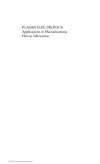Without plasma processing techniques, recent advances in microelectronics fabrication would not have been possible. But beyond simply enabling new capabilities, plasma-based techniques hold the potential to enhance and improve many processes and applications. They are viable over a wide range of size and time scales, and can be used for deposition, etching, and even process monitoring and diagnosis.
Plasma Electronics: Applications in Microelectronic Device Fabrication explains the fundamental physics and numerical methods necessary to bring these technologies from the laboratory to the factory. Beginning with an overview of the basic characteristics and applications of low-temperature plasma, preeminent experts Makabe and Petrovic explore the physics underlying the complex behavior of non-equilibrium (or low temperature) plasma. They discuss charged particle transport in general and in detail as well as macroscopic plasma characteristics and elementary processes in gas phase and on surfaces. After laying this groundwork, the book examines state-of-the-art computational methods for modeling plasma and reviews various important applications including inductively and capacitively coupled plasma, magnetically enhanced plasma, and various processing techniques, while numerous problems and worked examples reinforce the concepts.
Uniquely combining physics, numerical methods, and practical applications, Plasma Electronics: Applications in Microelectronic Device Fabrication equips you with the knowledge necessary to scale up lab bench breakthroughs into industrial innovations.
 |
|
О проекте
|
|
О проекте


